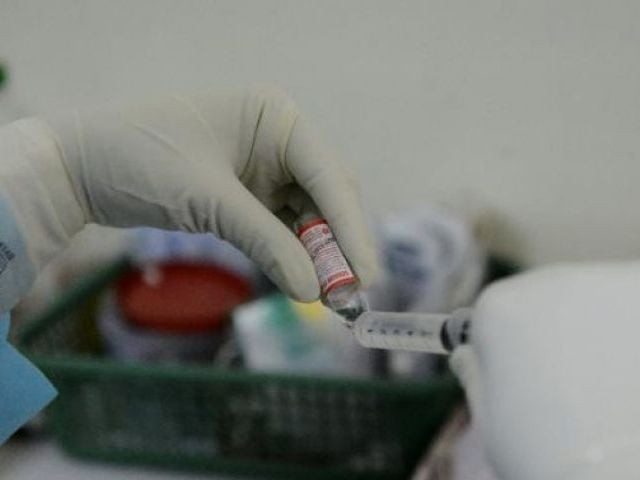Swine flu patients advised to hunt for antiviral meds
Lab confirms two dead, six infected in Swabi; govt, WHO run out of treatment

Lab confirms two dead, six infected in Swabi; govt, WHO run out of treatment. PHOTO: AFP
After two people died of swine flu and at least six others tested positive for the H1N1 or swine flu virus in Swabi, the government seems to have run out of the antiviral medicines which can treat and prevent the disease.
In fact, the World Health Organization (WHO), which the government would turn to replenish its supply, has advised anyone wanting protection or treatment from the illness to find the vaccine on their own, said senior health officials.
Iran blames Pakistan after 33 swine flu deaths
As many as 30 suspected cases were reported across Khyber-Pakhtunkhwa. National Institute of Health in Islamabad received 13 samples. Of these eight tested positive for H1N1, one for influenza B and four tested negative. At least 10 other reports are pending with NIH.
No drugs for you
Majority of the cases were reported from Swabi and six of these were confirmed by NIH, including a hospital nurse. Alarmingly, the district health officer said the provincial health department ran out of the antiviral drug used to treat and prevent H1N1 some time ago.
Officials said logistics and manpower support there was dismal; Personal Protective Equipment, anti-viral and vaccines either were not available or had expired. They said the fight against the disease was at a standstill and the health department was helpless, leaving people without any protection.
Suspected swine flu patient dies in Lahore
“Even the WHO seems to have stepped down and asked people to find the vaccine on their own,” a senior official said, requesting anonymity. When contacted, Swabi District Health Officer Dr Niaz told The Express Tribune he was infected with the ailment himself. He said steps were being taken to overcome the H1N1 influenza which was previously commonly called swine flu or pandemic influenza.
How you can catch swine flu
He warned the disease spreads through many areas of K-P in December and March/April. Niaz said all precautionary steps had been taken and an isolation ward was defined at Bacha Khan Medical Complex (BMC).
According to Centre for Disease Control and Prevention website, H1N1 spreads like the regular flu. Those who are infected can spread it to others up to about six feet away. “Most experts think flu viruses are spread mainly by droplets made when people with flu cough, sneeze or talk. These droplets can land in the mouths or noses of people who are nearby or possibly be inhaled into the lungs. A person might also get flu by touching a surface that has flu virus on it.” Niaz said the required items had been provided by the government, but confirmed the vaccine was not available with even the provincial health directorate.
Epidemic concern: Woman dies of swine flu, two test positive
When questioned over the reasons why the WHO was not being contacted to supply the vaccine on an emergency basis, the DHO said the organisation was approached after the vaccine ran out. However, it advised people to find their own.
Supply chain
The epidemiological data on the cases, thus far, did not indicate a specific regional or age-based cluster of cases. Personnel from the K-P Provincial Disease Surveillance and Response Unit (PDSRU), in collaboration with the Field Epidemiology and Laboratory Training Programme Pakistan, were regularly monitoring the developing situation at BMC.
A shipment of fresh viral transport medium (VTM) had been sent to Dr Amjad Mahboob, an official in the health chain, so samples can be collected in a timely manner.
When contacted, WHO K-P Spokesperson Dr Saeed Akbar refuted the allegations. He said his organisation responded to each and every request of the provincial government.
“We have not been told and nor have we made any statement related to the supply of the vaccines. We have no idea who spoke to Dr Niaz,” Akbar said. He added the WHO had provided personal protective equipment and training on an emergency basis. The spokesperson concluded with the claim the WHO had not been asked to supply any vaccine.
Published in The Express Tribune, December 15th, 2015.













COMMENTS
Comments are moderated and generally will be posted if they are on-topic and not abusive.
For more information, please see our Comments FAQ